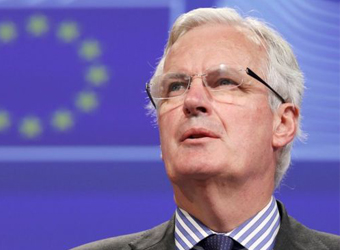The UK will have to reach a Brexit deal by October 2018, according to the EU’s chief negotiator for Brexit.
Michel Barnier told reporters that “time will be short” for negotiations because the proposed deal needed to be ratified as part of the two year process set to be triggered in March.
He said a taskforce of 30 people had been set up to make sure the EU would “be ready” when Article 50 was called.
He warned against “cherry picking” on issues such as the single market.
Speaking at the press conference in Brussels, Mr Barnier said: “Time will be short. It is clear the period for actual negotiations will be shorter than two years.
“At the beginning, the two years included the time for the council to set guidelines and to authorise negotiations. At the end, the agreement must of course be approved by the Council and European Parliament. Finally the UK will have to approve the agreement – all within the two year period.
“All in all there will be less than 18 months to negotiate. That is short. Should the UK notify by the end of March as Prime Minister Theresa May said she would, it is safe to say negotiations could start a few weeks later and an Article 50 deal reached by October 2018.”
Mr Barnier, making his first public speech on the issue, was appointed to the post of chief Brexit negotiator on 1 October this year by European Commission President Jean-Claude Juncker, who said he “wanted an experienced politician for this difficult job”.
The chief negotiator said he had spent time speaking to European member governments and said the Brexit negotiations had been informed by four main principles.
These included the “determination for unity” and a pledge to not start negotiations before being officially notified by the UK of its desire to leave, via the triggering of Article 50.
He also said: “Being a member of EU comes with rights and benefits. Third countries (non members as the UK will be after Brexit) can never have the same rights and benefits since they are not subject to the same obligations.
“The single market and its four freedoms (which includes freedom of movement) are indivisible. Cherry picking is not an option.”
The BBC’s Europe correspondent Damian Grammaticas asked Mr Barnier if the UK “paying in” to stay in the single market was a possibility after Brexit Secretary David Davis said last week the government “would consider it”.
“There is access to the single market, but this is accompanied by predetermined, very specific contribution to the EU budget,” said the chief negotiator.
“That is one of the models that already exists and that is one of the closest models there is to the EU without being a member.”
But Mr Barnier added there were various options for the table and until Article 50 had been called, there was little more he could say.
“It is up to the UK to tell us what they have in mind, then it is up to us at the 27 [member states] to say what we are prepared to conceive of.”
Mr Barnier said he “didn’t like to speculate very much” on what the future relationship between the EU and the UK would be, but it was time to “keep calm and negotiate”.
“The sooner, the better,” he added. “We all have a common interest in not prolonging the lack of certainty and we for our part need to concentrate on the European agenda on this new page that we will be writing in the history in the construction of the EU.
“There will be rebalancing but my conviction remains the same. Europe has to be the bedrock on which European citizens can lean in order to push ahead and construct the EU further for their safety, security, defence and prosperity.”
“It is much better to show solidarity than to stand alone.”
When in charge of regional policy, Mr Barnier said he worked on a programme supporting Northern Ireland and the Good Friday agreement.
When asked by The Irish Times whether he would dismiss the idea of a hard border being put in place post-Brexit, he would not commit either way.
“The UK decision to leave the EU will have consequences, in particular perhaps for what are the EU’s external borders today,” he said.
“All I can say at this moment in time is I am personally extremely aware of this particular topic. We will throughout these negotiations with the UK and of course with Ireland, do our utmost to uphold the success of the Good Friday Agreement and of course retain the dialogue there.”
A former EU commissioner, Mr Barnier led the EU’s banking reforms and was dubbed “the most dangerous man in Europe” by some in the financial services industry.
But after he championed capping bankers bonuses, he won respect as a tough but even-handed negotiator.
Mr Barnier has refused to take part in any pre-negotiations before Article 50 is triggered, but he did meet Brexit Secretary David Davis for coffee last month.
Speaking in November in Brussels, he said: “Don’t ask me to tell you what will be at the end of the road, we haven’t begun to walk yet.”
Source: BBC
